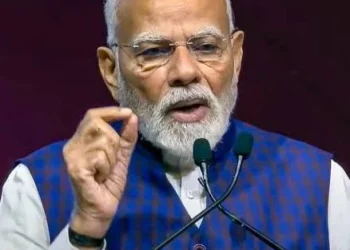Instead of uniting to celebrate 75 years of the Constitution, political leaders turned the occasion into a platform for blame games and accusations. Prime Minister Modi highlighted his government’s achievements, calling for civic responsibility and national unity, while Rahul Gandhi targeted the BJP for undermining democratic values. The debate left many wondering if the true spirit of the Constitution was lost in political wrangling.
BY PC bureau
The two-day debate — Glorious Journey of 75 Years of the Constitution of India in the Lok Sabha– turned into an exercise in scoring political points rather than taking a sincere look at the areas where the dreams of the Constitution’s framers remain unfulfilled.
The Opposition, led by Rahul Gandhi, accused the Modi government of undermining the Constitution, while Prime Minister Narendra Modi used the past to portray the Congress as habitual violators of constitutional principles. This back-and-forth left many feeling that a valuable opportunity for introspection and unity had been squandered.
In his closing remarks, PM Modi proposed 11 pledges aimed at preserving the Constitution’s spirit and achieving the vision of a developed India by 2047. These pledges included development for all, zero tolerance for corruption, and pride in India’s heritage. He emphasized fulfilling basic civic duties, claiming that India could achieve its goals if every citizen contributed. “Sabka Saath, Sabka Vikas (Together for Everyone’s Growth) is not just a slogan but an article of faith,” he asserted.
The Prime Minister contrasted the constitutional amendments made by his government with those of the Congress, arguing that the NDA’s changes strengthened governance, whereas the Congress used amendments to consolidate power.
Training guns at the Nehru-Gandhi family of the Congress, he said they left no stone unturned to strike blows to the Constitution. “This family challenged the Constitution at every level,” he said, adding that he was singling out the family as its members were in power for 55 years.
The family, having “tasted blood”, repeatedly wounded the Constitution, he said, citing several decisions of Jawaharlal Nehru, Indira Gandhi and Rajiv Gandhi when they held the office of prime minister. Their next generation is also into the same game, he said in a swipe at the Leader of Opposition in the House Rahul Gandhi and his MP sister Priyanka Gandhi Vadra.
His government, Modi said, repealed Article 370 to unify the country and brought in GST to roll out “one nation one tax” regime.
He hailed India‘s journey since the adoption of the Constitution in 1949 as “extraordinary”, asserting that the country’s ancient democratic roots have long been an inspiration for the world. India is not only a big democracy but it is the mother of democracy, he said in the Lok Sabha replying to a two-day debate on the 75 years of the adoption of the Constitution.
Modi said India has resolved to become a developed country by 2047 and its unity is the biggest requirement to achieve the goal. “Our Constitution is the basis of our unity,” he said.
Highlighting his government’s achievements, Modi pointed to the repeal of Article 370 as a step toward national unity and the implementation of GST as a stride toward “one nation, one tax.” He described India as the “mother of democracy,” with its ancient traditions inspiring modern governance. He declared the Constitution the cornerstone of India’s unity and called for collective resolve to make the country a developed nation by 2047.
In contrast, Rahul Gandhi targeted the BJP and RSS for their alleged alignment with Manusmriti rather than the Constitution. Citing V. D. Savarkar’s critique of the Constitution as “un-Indian,” Gandhi accused the ruling party of hypocrisy in claiming to uphold constitutional values. He also criticized the government’s policies, likening them to Eklavya’s forced sacrifice in the Mahabharata, alleging that schemes like Agnipath, monopolistic policies benefiting the Adani Group, and education system flaws amounted to a betrayal of the common man.
Both leaders used the debate as a platform for political grandstanding rather than focusing on issues like education, healthcare, unemployment, legal assistance, or economic opportunities. Instead of using the occasion to jointly address the ways in which democratic and judicial institutions have been weakened, the event devolved into a rhetorical battlefield.
The debate, intended to honor the Constitution’s legacy, highlighted the deepening divide in Indian politics, leaving the nation yearning for a more constructive and collaborative approach.














